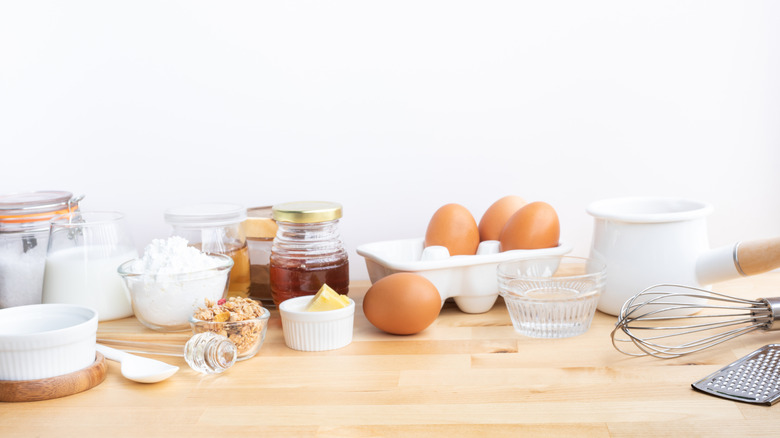How Long Can You Store Eggs On The Counter?
When shopping for eggs, most of us are used to heading to the refrigerated section that also typically stocks milk and other dairy products, grabbing a carton, and transferring it to the refrigerator, along with other perishable items, as soon as we get home — at least if we live in the United States. In the U.K. and Europe, Business Insider explains, farming practices focus on how to reduce the transmission of salmonella – a foodborne pathogen that exists on hens and in the tract that passes the egg as it is laid — that can penetrate the shell of the egg and potentially infect the person who eats it. In the U.S., different approaches exist: Namely, thoroughly washing and sanitizing eggs after they're collected, a process that is effective at reducing the presence of salmonella, but not completely eradicating it. Therefore, the U.S. Department of Agriculture (USDA) recommends always refrigerating eggs, in order to keep the risk of salmonella to a bare minimum.
So now you know that in contrast to any European or British friends or relatives, Americans shouldn't store eggs on the counter at all. But what about recipes that call for room temperature eggs, such as a perfect fried egg or in baking, when most recipes advise that eggs be room temperature in order to better incorporate with other ingredients (via Food Network)?
Here's how long you can safely — temporarily — store eggs on the counter.
Toss eggs that have been on the counter for more than 2 hours
Maybe you've taken some eggs out of the refrigerator to bring them to room temperature before baking, or perhaps you're cleaning up after cooking brunch only to find that you've left the egg carton out instead of putting it back in the fridge. Whatever the case, the USDA is firm in its recommendation that any eggs that have been on the counter for more than two hours have to be tossed.
According to the agency, temperature fluctuations increase the risk of potential salmonella on the outside of the egg penetrating the shell, reaching the egg, and infecting the person who eats it. When cold eggs are placed somewhere that's warmer, the USDA explains, condensation begins to form on the outside of the egg, which can both aid the multiplication of any bacteria as well as help them to pass through the shell.
So what if you're purposely leaving eggs out in order to warm them up a bit before cooking? Instead of letting them sit on the counter, where the eggs could take up to two hours to come to room temperature (via Food Network), it's better to use the bowl of water method to quickly bring the eggs up to temp. According to Food Network, refrigerator-chilled eggs placed in a bowl of warm water will reach room temperature in just a few minutes. It's definitely a better approach than risking a nasty case of food poisoning.

